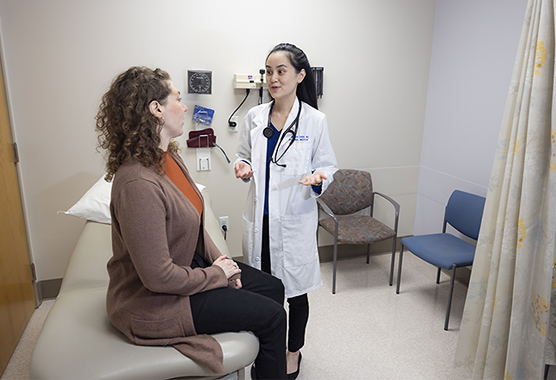Yeast Infection (Candidiasis)
You can rely on our infectious disease specialists to accurately diagnose and treat candidiasis, from common vaginal yeast infections to serious, invasive yeast infections.
Medically reviewed by Dean Blumberg, M.D. on Nov. 12, 2024.

Providing Care for Yeast Infections
At UC Davis Health, we provide prompt and expert care for yeast infections. Our specialists pinpoint the type of Candida causing the infection and recommend the most effective treatment for you. In our Division of Infectious Diseases, we advance care through research and innovation for severe invasive yeast infections.
Types of Yeast Infection
A yeast infection (candidiasis) is an overgrowth of a fungus called Candida (yeast). Many different species (types) of Candida live on your skin and in your body naturally.
Usually, bacteria in your body keep yeast from overgrowing. If yeast grows too much, it can cause a yeast infection.
You can develop several kinds of candidiasis, including:
- Esophageal yeast infection, which occurs in the esophagus
- Invasive yeast infection, which develops in the blood and can spread to your organs
- Skin yeast infection, affecting the skin, particularly around the mouth, armpits, groin or nails
- Thrush, a yeast infection of the mouth or throat
- Vaginal yeast infection, which develops in the vagina
Yeast Infection Symptoms
Yeast infection symptoms vary depending on the location of the infection. You will have symptoms where the infection occurs — the vagina, mouth, throat or esophagus.
Common Symptoms
You may experience several symptoms with a yeast infection, including:
- Itching
- Pain
- Redness
- Soreness
- Trouble swallowing
- Vaginal discharge
- White patches
Invasive Yeast Infection Symptoms
Invasive candidiasis can cause more severe symptoms and health issues and can be life-threatening. It typically develops in people with other serious illnesses. You may experience:
- Chills
- Cognitive symptoms, such as confusion or headaches
- Fever
- Rash
- Stomach pain
- Vision problems
Yeast Infection Causes and Risk Factors
Yeast can grow too much and cause an infection for several reasons. It thrives in warm, moist environments. It also overgrows if your body can’t properly control it.
Invasive yeast infections tend to affect people who:
- Are hospitalized for multiple days and already very ill
- Have a central venous catheter
- Have conditions affecting their immune system
- Just underwent surgery
Things that contribute to the development of a yeast infection include:
Antibiotics
Antibiotics, while helpful in treating harmful bacteria and infections, also harm the good bacteria in your body. When you have less healthy bacteria, yeast can grow out of control.
High Blood Sugar
Candida relies on sugar to grow. Conditions such as diabetes increase your blood sugar and, therefore, your risk for yeast infections. Corticosteroid medication also increases your blood sugar.
Hormone Changes
Pregnancy can cause hormone changes that make the vagina more acidic. An acidic environment allows yeast to grow more and can lead to a vaginal yeast infection.
Invasive Medical Equipment
Medical equipment can transfer yeast from your skin into your bloodstream. For example, you face a higher risk of an invasive yeast infection if you have a central venous catheter (a thin tube placed in a large vein for medication or fluid delivery).
Unhealthy Immune System
Conditions or treatments that weaken your immune system make it easier for Candida to grow. For example, cancer, chemotherapy, human immunodeficiency virus (HIV) and organ transplantation can increase your risk for yeast infections.
Diagnosis and Testing for Yeast Infections
Our infectious disease team expertly diagnoses all types of yeast infections. We check for signs of infection with a physical exam. We also determine what species of Candida causes the infection. By accurately diagnosing the Candida species, we can recommend the most effective treatment.
We may do a few tests, depending on your symptoms:
- A swab or gentle scrape of the affected area, which we test for Candida
- Blood test, to check for Candida in the bloodstream
- Endoscopy, which helps us see inside the esophagus using a thin tube with a camera on the end
Yeast Infection Treatments
At UC Davis Health, we care for common and complex yeast infections. Our specialists recommend treatment based on your specific symptoms, type of yeast infection and overall health. We may recommend:
Antifungal Medication
Antifungal medication helps get rid of yeast and prevents more yeast from growing. We may recommend antifungal pills, cream, lozenges, an oral gel or an oral rinse. Different types of antifungal medication target different Candida species. We determine the medication type and dose you need.
Invasive Candidiasis Treatment
For invasive yeast infections, we provide more intensive, life-saving treatment. We give antifungal medication directly into your bloodstream using an IV (intravenous therapy). Our specialists closely monitor your health and adjust your medication as needed. We strive to keep the infection from worsening and to preserve your internal organ health.
Clinical Trials
Some yeast infections do not respond to antifungal medication. You have access to advanced therapies through clinical trials at UC Davis Health. Our infectious disease specialists are actively studying ways to cure life-threatening invasive yeast infections.
Preventing Yeast Infections
Our specialists offer prompt treatment to relieve your symptoms and prevent yeast infections from progressing to invasive yeast infections. We help you understand and manage your risk with antifungal medication if needed. You can also take precautions to prevent yeast infections through your:
Clothing Choices
Vaginal yeast infections can develop more easily in moist and warm environments. You can wear cotton underwear and loose, breathable pants to help prevent candida growth. Also, avoid staying in a wet swimsuit once you’ve finished swimming so your vaginal area can dry.
Medication Usage
Antibiotics and corticosteroids increase your risk of developing a yeast infection. Only take them as prescribed and follow the instructions on your medication.
Oral Hygiene
Practicing good oral hygiene helps prevent thrush and esophageal yeast infections. Brush, floss and keep up with regular dental cleaning appointments. If you need to take inhaled corticosteroids, be sure to brush your teeth after using the medication.
Each year
25KInvasive bloodstream yeast infections occur in the United States
Source: Centers for Disease Control and Prevention (CDC): Data and Statistics on Candidemia
Request an Appointment
As Sacramento's No. 1 hospital, you'll benefit from unique advantages in primary care and specialty care. This includes prevention, diagnosis and treatment options from experts in 150 specialties.
Referring Physicians
To refer a patient, submit an electronic referral form or call.
800-4-UCDAVIS
Patients
Call to make an appointment.
Consumer Resource Center
800-2-UCDAVIS

Ranked among the nation’s best hospitals
A U.S. News & World Report best hospital in cardiology, heart & vascular surgery, diabetes & endocrinology, ENT, geriatrics, neurology & neurosurgery, and pulmonology & lung surgery.

Ranked among the nation’s best children’s hospitals
U.S. News & World Report ranked UC Davis Children’s Hospital among the best in pediatric nephrology, orthopedics*, and pulmonology & lung surgery. (*Together with Shriners Children’s Northern California)

Ranked Sacramento’s #1 hospital
Ranked Sacramento’s #1 hospital by U.S. News, and high-performing in aortic valve surgery, back surgery (spinal fusion), COPD, colon cancer surgery, diabetes, gynecological cancer surgery, heart arrhythmia, heart failure, kidney failure, leukemia, lymphoma & myeloma, lung cancer surgery, pacemaker implantation, pneumonia, prostate cancer surgery, stroke, TAVR, cancer, orthopedics, gastroenterology & GI surgery, and urology.

The nation’s highest nursing honor
UC Davis Medical Center has received Magnet® recognition, the nation’s highest honor for nursing excellence.

World-class cancer care
One of ~59 U.S. cancer centers designated “comprehensive” by the National Cancer Institute.

A leader in health care equality
For the 13th consecutive year, UC Davis Medical Center has been recognized as an LGBTQ+ Healthcare Equality Leader by the educational arm of America’s largest civil rights organization.

